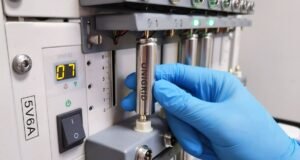South Korea’s rapidly expanding AI chip industry has seen a surge in fundraising events as the demand for hardware to power AI applications continues to skyrocket. In a strategic move, two of Korea’s top fabless AI chip startups, Rebellions and Sapeon, have joined forces in a merger announcement made on Wednesday.
The merger aims to position Rebellions and Sapeon as leaders in the fabless AI chip market in South Korea, in direct competition with global giants like Nvidia. Industry sources familiar with the companies’ plans suggest that the merged entity could potentially go public within the next two to three years.
The next two to three years are seen as a “golden time” for South Korea to dominate the global AI chip market, say the two companies in a joint statement. With the increasing demand for neural processing units (NPUs), the merged entity plans to strengthen their NPU business post-merger.
This merger comes at a critical moment for the worldwide chip industry. Nvidia currently holds a dominant 97% share of the specialized AI chip market, thanks to its early entry into providing data center services and software. However, for companies like Rebellions and Sapeon, there is still plenty of ground to be gained by taking action now. The rise in demand and decrease in chip availability has led to a rise in costs for compute, and AI companies are actively seeking to reduce their reliance on Nvidia for hardware.
Earlier last month, Apple announced its plans to use its own chips to power its AI data centers, while other tech giants like Google, Amazon, and Microsoft are also developing their own AI hardware. In a direct challenge to Nvidia, Intel, AMD, Google, Meta, ARM, Broadcom, and others have come together to develop a standard for connecting AI accelerator chips used in servers.
The Road Ahead
The merger ratio for Rebellions and Sapeon has not been disclosed yet, but the companies have revealed that they will begin due diligence, which is expected to take a month. The transaction is expected to be finalized in the second half of 2024. Rebellions’ management team will lead the new entity, and all employees from both companies will join the new organization. With a team of 130 employees, Rebellions will be joined by more than 100 employees from Sapeon, both in South Korea and the U.S.
Two of South Korea’s biggest telecommunications companies, SK Telecom and KT, will continue to hold shares in the merged entity, along with the second-largest memory chip maker in the world, SK Hynix. SK Telecom and SK Hynix are current backers of Sapeon, while Rebellions is owned by KT.
It remains unclear whether Rebellions will maintain its partnership with Samsung Electronics, a competing semiconductor company, after the merger. In an earlier interview with TechCrunch, Rebellions stated that their latest AI chip, Rebel, would use Samsung’s 4-nanometer fabrication process and be incorporated into Samsung’s HBM3E memory chips, which are used for large language models.
In 2023, KT integrated Rebellions’ datacenter-focused AI chip, Atom, into its cloud-based NPU infrastructure. However, post-merger, Rebellions has announced that it will manufacture this particular NPU chip using Samsung’s 5-nanometer fabrication process. Designed for data centers and language models of up to 7 billion parameters, Atom will complement Rebel, which targets larger models.
The Merger and Beyond
The announcement comes just four months after Rebellions’ successful Series B funding round, raising $124 million and valuing the company at approximately $658 million.
Established in 2016 and spun out in 2022 from SK Telecom, Sapeon specializes in developing NPU hardware and full-stack software. In November 2021, the company launched its 7-nanometer AI chip, X330 NPU, catering to the autonomous vehicle market. Sapeon also plans to release an on-device AI chip targeting the edge computing sector. In August 2023, the company raised over $45 million in its successful Series A funding, reaching a valuation of over $380 million.








